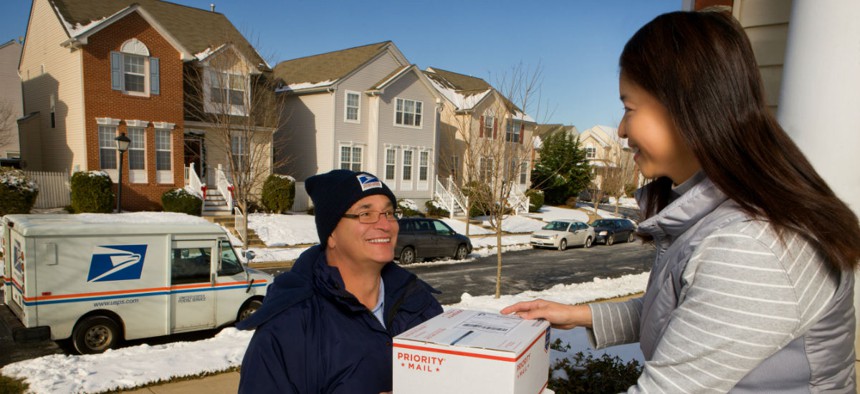
U.S. Postal Service
Americans Support Cutting Mail Services to Save USPS, Survey Finds
Voters don't want the Postal Service to take up banking.
A majority of Americans support significant changes in U.S. Postal Service operations to help secure the agency’s financial future, according to a new survey released Tuesday.
The poll, conducted by the Program for Public Consultation at the University of Maryland’s School of Public Policy, found nine in 10 Americans -- when provided with background information on the subject -- support allowing the Postal Service to provide new non-postal products and services. USPS is currently prohibited by statute from offering such options.
Eight in 10 respondents approved of dramatically cutting the prefunding of retirees’ health benefits, something Congress has required since 2006 and which has placed large financial burdens on the cash-strapped agency. They did not support cutting the requirement entirely, but rather spreading out the payments over time -- a proposal that has been backed in several different iterations of postal reform bills floated on Capitol Hill.
PPC called the survey a “citizen cabinet” that consisted of a representative sample of 2,256 voters. The respondents go through a “policymaking simulation” that provided them with information as if they were lawmakers. The surveyors met with congressional staffers in both parties to craft the questions and the pros and cons of each policy.
Steven Kull, a political psychologist who directed the poll, said the results show that while Americans may not love the idea of cutting services or raising prices, they are willing to make some tradeoffs.
“The Postal Service acting more like a business,” Kull said, “people want that.”
The controversial proposal to end Saturday mail delivery, which Congress has repeatedly blocked the Postal Service from implementing, was supported by two-thirds of the respondents. A majority -- 60 percent -- even supported raising the cost of stamps and other postal services faster than the rate of inflation, as they are currently indexed. In recent years, the Postal Service has opted to reduce hours at post offices rather than closing them altogether. Two-thirds of American voters, however, would support closing as many as 5 percent of the post offices losing money in a given year, the survey found.
About 65 percent of respondents said it would be at least “tolerable” to not provide its full array of services to areas where it is costly to do so.
Respondents rejected some proposals, such as converting most door deliveries to curbside or cluster boxes. The most recent iteration of postal reform took out language in previous bills that would have required phasing out the delivery of mail directly to doors, and just 41 percent of respondents would favor the change. One revenue-generating idea that has received broad attention is allowing USPS to engage in financial services, though only 32 percent of respondents -- and less than one-quarter of Republicans -- supported post offices offering small-scale individual savings accounts.
A proposal to force arbitrators to consider USPS’ financial condition when settling collective bargaining disputes has been widely rebuked by postal unions, but 84 percent of respondents found it tolerable or acceptable.
Kull said his style of polling helps give voice to regular Americans, who regularly express concerns that only special interests are heard in Congress. Already, he added, he has seen evidence the poll has helped “facilitate conversations across the parties in a constructive way.” He has previously used his citizen panel to solicit opinion on the Iran nuclear deal, and wanted to focus on the Postal Service as reform efforts have repeatedly been stymied by parochial interests.
“We’re particularly interested in issues where the Congress has gotten stuck and they just don’t seem to be able to move,” Kull said. “When we were telling various people in Congress about this project, a number of people said, ‘it would be great if you could do something about the Postal Service, were just so stuck there.’”
The margin of error was 3.7 percent; it was fielded from July 2 through Aug. 12.
NEXT STORY: Remembering What’s at Stake







